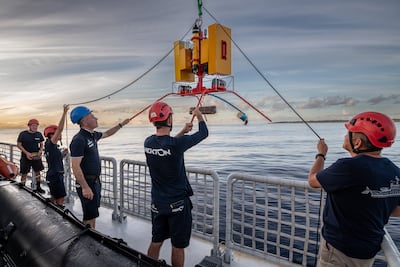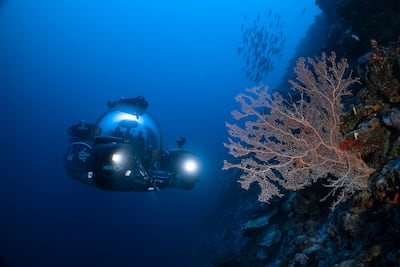Scientists on Thursday launched a mission to discover 100,000 new species in the world's oceans.
The "ocean census" will be carried out by divers, submarines and deep-sea robots.
Experts behind the initiative say little more than 10 per cent of marine life has been discovered.
The project is being led by researchers in the UK and Japan.
New species discovered will be sent to laboratories around the world for imaging and DNA sequencing.
The endeavour comes as climate change and pollution raise fears for marine life.
Mitsuyuki Unno, the head of the Nippon Foundation, a Japanese philanthropic group, said he hoped the project would "catalyse global efforts to conserve our ocean".
"Ocean life makes all life on Earth possible and holds the wisdom of four billion years of our evolution on Earth," said Yohei Sasakawa, the foundation's chairman.
"We can't protect what we don't know exists."

Researchers hope that sharing their findings worldwide will speed up the process of scientifically describing new species.
New technology means this could be done in a few months rather than taking several years, said Alex Rogers, the project's science director.
"Revolutions in technologies such as digital imaging, sequencing and machine learning now make it possible to discover ocean life at speed and at scale," he said.
The project's aim is to find at least 100,000 new species in its first decade.
New species will be given Latin scientific names, and colloquial names in some cases.
Ocean Census scientists believe there could be as many as 2.2 million species lurking in the water – with only about 240,000 found so far.
The census will involve dozens of expeditions to marine biodiversity hot spots, making use of private and government-owned research vessels, organisers say.

They see their mission as building on historic expeditions such as the voyages of HMS Challenger, which made early deep-sea discoveries between 1872 and 1876.
"We have a race against time to discover ocean life before it is lost for generations to come," Mr Sasawaka said.
"Ocean Census will create an immense wealth of openly accessible knowledge that will benefit and sustain all life on Earth, for humankind and our planet."
Marine life is endangered by factors such as warming ocean temperatures, declining water quality, overfishing and pollution, according to UN experts.
A global biodiversity pact signed last year calls for 30 per cent of the world's land and oceans to be placed under protection by 2030.
Countries agreed that biodiversity "is fundamental to human well-being and a healthy planet".
Only an estimated 8 per cent of the world's marine areas are currently under protection.


